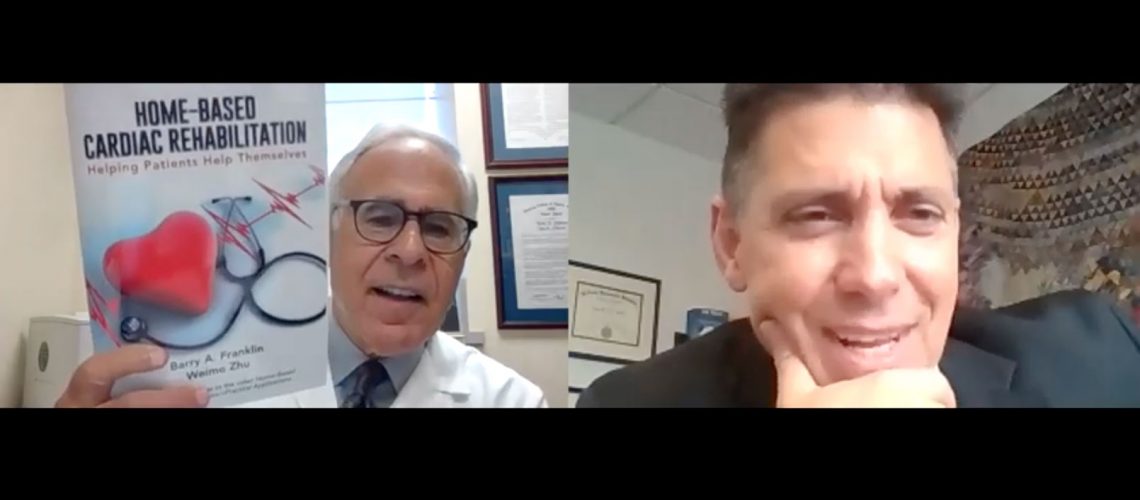Home » Preventive Cardiology and Cardiac Rehabilitation Expert, Dr. Barry Franklin
Preventive Cardiology and Cardiac Rehabilitation Expert, Dr. Barry Franklin

Dr. Franklin is a rare gem, with amazing achievements (and without the ego!). He is the Director of Preventive Cardiology and Cardiac Rehabilitation for the Beaumont Health Systems’ Royal Oak Michigan Hospital – one of the largest hospitals in the world at over 1000 beds. He is past president of the American College of Sports Medicine and past Board Member of the national American Heart Association.
This interview went by in a flash because listening to Dr. Barry Franklin is wonderful ear candy that’s healthy for you! We covered an incredible number of pertinent topics for anyone who wants to learn more about heart health.
Topics We Discussed on Coronary Disease, Cardiac Rehabilitation, Diet and Exercise
- The meaning of “metabolic equivalents” (mets) – units of energy expenditure – achieved on an exercise stress test and how it relates to quality and quantity of life, as well as exercise prescription.
- The three most important foundational factors in cardiovascular health.
- The power of walking – not necessarily powerwalking! – and when, relative to exercise, it may be possible to get “too much of a good thing.”
- The risks of shoveling heavy wet snow during the winter months.
- Aspirin’s benefits and risks in the primary and secondary prevention of heart disease.
- How much relative weight loss percentage is meaningful to reduce cardiometabolic risk (spoiler alert: not as much as you may think).
- What Dr. Franklin does for exercise, and how his wife helps them fit it into their lifestyle.
- Health impacts of continuing to sit too much and how to become physically active by breaking the chair jockey habit.
- The strengths and limitations of exercise stress testing and when coronary calcium scoring might be appropriate to detect sub-clinical early stage heart disease.
- An easy to read, high impact resource that Dr. Franklin co-wrote to help people achieve safe and effective exercise-based cardiac rehabilitation at home.
Statistical Facts Related to Coronary Disease and Cardiac Rehab
Dr. Franklin offers a wealth of statistical information in our interview. Did you know that 85% of adults over the age of 50 have some form of coronary artery disease? Dr. Franklin explains why and what you can do to counteract its affects.
The vast majority of heart attacks occur after known blockages of only 30-60% on recent angiograms, not the 75-85% lesions that one might expect.
Dr. Franklin reviews optimal blood pressure levels and heart rates. There are many good studies, he says, that conclude “in general, lower is better.” The New England Journal of Medicine’s ‘Sprint Trial’ concluded that those who achieved 120 systolic pressure or lower had 25-28% lower death rates. For heart rates, the optimal, again in general, is 55-70 beats per minute.
Dr. Franklin concludes, “An exercise program, in and of itself, will typically lower the resting heart rate by 10 beats. That’s pretty significant.”
One of the biggest takeaways from our interview is that everyone who wants to start an exercise program will gain a great deal of cardiac benefit by walking, NOT jogging, starting at a low-level 2-3 miles an hour. Of course, consult your physician before starting any physical exercise program.
Home-Based Cardiac Rehabilitation
Dr. Franklin and his colleague Dr. Weimo Zhu have written a booklet on what I like to call “prehab,” because it offers great advice on cardiac prevention as well as rehab. The booklet emphasizes at-home rehab and covers everything from diet to exercise to pharmaco therapies.
Home-based cardiac rehabilitation is not a new concept. But it’s new to patients who have never thought about cardiac issues before. Dr. Franklin’s booklet is perfect for coffee tables and waiting rooms of cardiologists or primary care doctors’ offices. The booklet is available at publisher HealthyLearning.com.
Sit back, relax, and enjoy our interview. Or better yet, plug in your earbuds and take a walk while listening to this wonderful man who is a resource for all of us: Dr. Barry Franklin.

